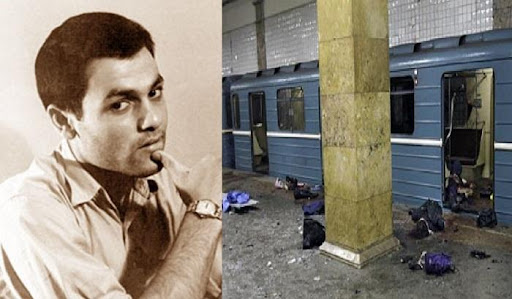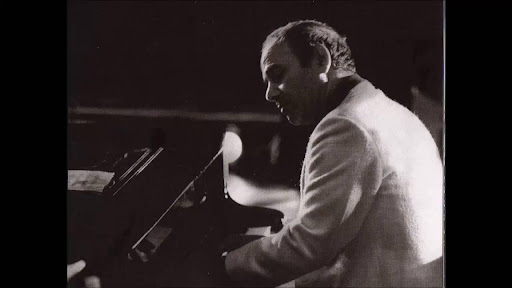
The last melody: An Azerbaijani genius who became a victim of terrorism
28 years has passed since the tragic terror incident in the Baku metro
18 March 2022
"That day my father had to go to the recording studio, and then to the Song Theater. In the evening people started looking for him in the Song Theater. There was a great tragedy in Baku, the whole city was up, everyone was worried. It never occurred to us that our father might be on that train, but as time went on, the anxiety peaked. My sister's husband started looking in the morgues. And it turned out that ... ”
This is what his daughter Gulara says. Remembering that day, yes, that terrible day. March 19, 1944.
***
On March 19, 1994, at 13:00, an explosion occurs at the 20 Yanvar metro station. A clockwork bomb placed on the train's main car explodes after it stops at the station. The blast kills 14 and injures 49 people.
It was a terrorist attack. And one of the victims of this terrorist attack was the People's Artist of the Republic of Azerbaijan Rafig Babayev.

On the morning of March 19, Rafig Babayev leaves home and wants to start his car. But every time the car turns off, the engine does not start. The artist hurries to the recording and goes to the subway ...
***
Rafig Babayev was one of the luminaries of national jazz. He was born on March 31, 1936 in the large family of Farzi Babayev, who worked in the party bodies. The Babayev family had a great interest in music.
His elder sisters - Marziya became a pianist, Vasila - a harpist, his brother Ogtay - a wind instruments player, Rafig - a composer, pianist, arranger. His younger sister, Armanus, was a music theorist. Probably, if the parents had not lost their daughter Emile as a child, there would have been another musician in the family.
Rafig entered the music school No. 160 in 1943 and later continued his education in the piano class of the music school named after Asaf Zeynalli. In addition to studying at this school, he worked as a music director of an ensemble of folk instruments. At the same time, he was also interested in jazz music and improved his improvisation skills.
In the 1950s, the entire USSR, especially Baku, breathed jazz. Later, thanks to Vagif Mustafazadeh and Rafig Babayev, Baku would become one of the jazz centers of the USSR. From the words of his sister Armanus khanum:
“Rafiq wanted to listen to these songs again and again. He just didn't listen, he immediately tried to play and write it."
Later, the artist himself would say:
“We were passionate about jazz music. At night, my brother Ogtay and I would sit in front of the radio, and we could hardly record music on an old tape recorder. ”

Although Rafig was seriously engaged in jazz, he didn`t stop his education halfway. He enrolled the conservatory. Rafig Babayev and his teacher, Professor Rauf Atakishiyev, had been friends since their student years, and this relationship had lasted for a long time. Later, the artist, who devoted himself entirely to jazz music, graduated from the conservatory and, as the leader of the music group, went on long tours to various cities of the Soviet Union. He led the group for three years, from 1960 to 1962.
It is said that a map was later found in Rafig Babayev's archive. The map showed the cities where the band had performed for three years.
After returning to Baku, Rafig Babayev met the famous singer Rashid Behbudov.
When Rashid Behbudov established the Song Theater in 1967, Rafig Babayev was invited to be the musical director of the theater. R.Babayev and R.Behbudov are preparing a big theatrical concert program. Rafig is doing a great job to stage this play. During all these years, Rafig continues his creative work in the field of jazz music, is constantly engaged in this work, participates in jazz festivals. In 1967, Rafig Babayev's ensemble won the International Jazz Festival in Tallinn. His composition "Bayati-Kurd" is especially noted.
In addition, he had written music for 25 documentaries and feature films, as well as cartoons over 20 years.
He was friends with another jazz legend, Vagif Mustafazadeh. From what his daughter Fariza said:
“My father was 4 years older than Vagif Mustafazadeh, and Uncle Vagif always respected this seniority. He consulted with my father about everything. They worked together. They listened to each other. Once a call came home, I answered, I was young, I did not understand anything. I told my father that some Vagif had died. My father's color turned pale at that moment. He did not want to believe and still did not know exactly which Vagif passed away. He called a couple of places, then froze in place. The news shocked him so much that he could not come to his senses for a long time. Then my father played a big role in the upbringing of Aziza Mustafazadeh."
Sometimes when listening to the music of Vagif and Rafig, a person has such a strange fantasy that thanks to Mustafazadeh and Babayev, the idea of jazz could become an all-Azerbaijani idea. Indeed, both figures who created the image of Azerbaijani jazz are equally important to Azerbaijani music.
Mustafazadeh and Babayev started performing in the 1960s in small, not large groups.
***
"In this regard, we were lagging behind the United States - where this trend began in the 1940s. Later, the musicians parted ways - Vagif performed in a group until the end of his life, giving concerts, and Rafig first demonstrated his skills in "Gaya", then in Rashid Behbudov's team, on television, and finally in the film studio. Every decade, he brings innovations to existing projects and improves them with his experience. ”
This is what another jazz luminary, musician Salman Gambarov says.
Rafig Babayev's framework was based on national folk and professional classical Azerbaijani music. It was a synthesis of Azerbaijani mugham and our composers` songs. Mugham was a mystical, divine music for him. He brought a new breath of mugham and jazz to Azerbaijani music and wanted to develop and improvise it.
In 1991, Rafig Babayev organized the “Jangi” folk-jazz ensemble and established a recording studio to assist in the implementation of music projects. Using folk instruments, he created beautiful compositions, enriching them with unusual harmony, combining in a melodic way the music of the West and the East, which at first sight contradicted each other.
In 1993, Rafig Babayev was named People's Artist of the Republic of Azerbaijan.
***
Academician Rafael Huseynov wrote:
“Rafig Babayev, a patient man (This was a very important aspect of working with an artist like Rashid) of high taste, invaluable both in composition and performance, capable of creating unexpected beauties out of nowhere, was the second discovery in Rashid Behbudov's creative life after Tofig Guliyev. That was, in fact, a gift from God”.
Interestingly, the pursuit of the great jazzmen by fate was as inevitable as the talent God gave them.
***
On the morning of March 19, Rafig Babayev left the house and wanted to start the car. But every time the car turns off, the engine does not start.
If only that car would not break down. Who knows, maybe this was his last improvisation ...
Author: Adam Jabrayil
Translator: Gulnara Rahimova












